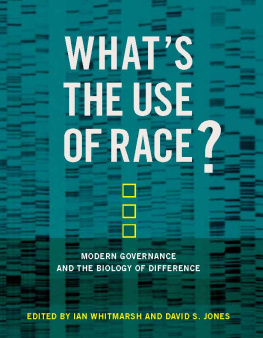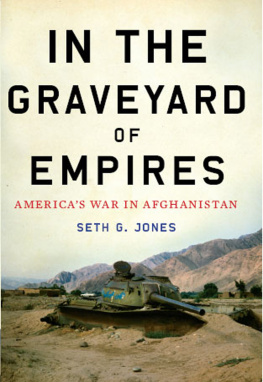Jones - Whats the Use of Race?
Here you can read online Jones - Whats the Use of Race? full text of the book (entire story) in english for free. Download pdf and epub, get meaning, cover and reviews about this ebook. year: 2010, publisher: MIT Press, genre: Politics. Description of the work, (preface) as well as reviews are available. Best literature library LitArk.com created for fans of good reading and offers a wide selection of genres:
Romance novel
Science fiction
Adventure
Detective
Science
History
Home and family
Prose
Art
Politics
Computer
Non-fiction
Religion
Business
Children
Humor
Choose a favorite category and find really read worthwhile books. Enjoy immersion in the world of imagination, feel the emotions of the characters or learn something new for yourself, make an fascinating discovery.
Whats the Use of Race?: summary, description and annotation
We offer to read an annotation, description, summary or preface (depends on what the author of the book "Whats the Use of Race?" wrote himself). If you haven't found the necessary information about the book — write in the comments, we will try to find it.
Jones: author's other books
Who wrote Whats the Use of Race?? Find out the surname, the name of the author of the book and a list of all author's works by series.
Whats the Use of Race? — read online for free the complete book (whole text) full work
Below is the text of the book, divided by pages. System saving the place of the last page read, allows you to conveniently read the book "Whats the Use of Race?" online for free, without having to search again every time where you left off. Put a bookmark, and you can go to the page where you finished reading at any time.
Font size:
Interval:
Bookmark:
What's the Use of Race?
What's the Use of Race?
Modern Governance and the Biology of Difference
edited by Ian Whitmarsh and David S. Jones
The MIT Press
Cambridge, Massachusetts
London, England
2010 Massachusetts Institute of Technology
All rights reserved. No part of this book may be reproduced in any form by any electronic or mechanical means (including photocopying, recording, or information storage and retrieval) without permission in writing from the publisher.
MIT Press books may be purchased at special quantity discounts for business or sales promotional use. For information, please e-mail or write to Special Sales Department, The MIT Press, 55 Hayward Street, Cambridge, MA 02142.
This book was set in Stone Sans and Stone Serif by Toppan Best-set Premedia Limited. Printed and bound in the United States of America.
Library of Congress Cataloging-in-Publication Data
What's the use of race? : modern governance and the biology of difference / edited by Ian Whitmarsh and David S. Jones.
p. cm.
Includes bibliographical references and index.
ISBN 978-0-262-51424-8 (pbk. : alk. paper)
1. GeneticsSocial aspects. 2. Racism. I. Whitmarsh, Ian, 1975 II. Jones, David S. (David Shumway), 1970
QH438.7.W53 2010
323.11dc22
2009037118
10 9 8 7 6 5 4 3 2 1
Acknowledgments
This book is the final product of a series of conversations begun at a conference hosted by the Center for the Study of Diversity in Science, Technology, and Medicine (CSD) in April 2008. The CSD was founded at the Massachusetts Institute of Technology (MIT) in June 2000 by a generous grant from The Andrew W. Mellon Foundation. Professor Evelynn M. Hammonds envisioned a center that would pursue two primary goals. Scholars would examine the impact of diversity on the theory and practice of science, medicine, and technology, as well as the contributions of racial and ethnic minorities to those fields.
Starting in 2006, the CSD organized a series of three conferences that explored questions of race and technology. The first, Race, Pharmaceuticals, and Medical Technology, focused on BiDil, the first (and still only) medication approved by the Food and Drug Administration for use in a specific racial or ethnic group, people who self-identify as black. Many of the papers from this conference were published as a special symposium in the Journal of Law, Medicine & Ethics in the fall of 2008. Generalizing beyond pharmaceuticals, the 2007 conference, The Business of Race and Science, examined how the modern sciences of race have been used to justify a series of race-specific products and policies, from cosmetics, vitamins, and jogging shoes to tests of genetic ancestry. The final conference, Whats the Use of Race, broadened the conversation still further, asking how race has been, and should be, used in governance, with examples drawn from law, science and medicine. A subset of the papers presented were expanded into full length essays and then revised substantially to produce the essays found in this volume.
The conference and this resulting volume would not have been possible without the assistance of many people. Rosalind Williams and David Mindell, the chairs of the Program in Science, Technology, and Society (STS) at MIT, and Philip Khoury and Deborah Fitzgerald, the deans of the School of Humanities, Arts, and Social Sciences, provided an institutional home and much needed support for the CSD. Debbie Meinbres, who orchestrated public programs for STS, handled most of the planning and logistical details that made each of the three conferences a seemingly effortless success. The conferences themselves would not have been possible without the thoughtful contributions of all of the speakers, as well as the active participation of a surprisingly dynamic and challenging audience. Many of our colleagues at MIT, especially Stefan Helmreich, Erica James, Heather Paxson, Susan Silbey, Mike Fischer, David Kaiser, Beth Coleman, Melissa Nobles, and Abha Sur provided useful advice as well. Evelynn Hammonds, despite her new roles at Harvard University, always remained a valuable source of wisdom.
At MIT Press, Marguerite Avery has been an exceedingly encouraging and productive editor. Erin Shoudy, Marcy Ross, and Deborah Cantor-Adams guided us through the maze of details of the publishing process. Continued support from The Andrew W. Mellon Foundation allowed us to see this project through to completion.
None of these essays are expected to provide the last word on these subjects. We hope, however, that they will stimulate on-going dialog on these vital issues for science and society.
1 Governance and the Uses of Race
Ian Whitmarsh and David S. Jones
Race in America at the start of the twenty-first century remains in a turbulent ferment. The erosion of segregation in schools, workplaces, marriages, and politicsan erosion symbolized by the election of the first black presidentis accompanied by, and masks, persistent racial inequalities and injustices. Although some crises, such as Hurricane Katrina or the state of American prisons, have brought continuing racial injustice into the public eye and led to calls for remediation, legislatures and courts in the United States have retreated from affirmative action and other traditional policies that sought to compensate for the history of racial inequality. Yet even as the government backs away from race-based social welfare policies, it has established the importance of race in medical research and practice: federally funded research must now examine racial difference, and both the Patent and Trademark Office (PTO) and the Food and Drug Administration (FDA) have sanctioned the concept of race-specific pharmaceuticals.
Such government action on race is in line with broad interest in addressing racial disparities through technological means. The marketplace is now flush with products advertised as solutions for racial injustice. Race-specific vitamins offer to rescue dark-skinned peoples from the vitamin deficiencies they suffer as a result of having movedor been moved by slaveryfrom the sunny tropics to temperate climates. Race-specific genetic tests can recover the ancestral histories of African Americans whose heritage had been erased by the slave trade. Nike has even marketed race-specific jogging shoes, designed specifically for the supposedly thicker feet of American Indians, to combat the epidemic of obesity and diabetes on impoverished reservations.
The current tumult in race commerce and governance can be traced, in part, to recent and surprising developments in the science of genetics and race (Koenig, Lee, and Richardson 2008). Coming out of the civil rights era, many scientists and scholars joined a consensus that found race to be nothing more than an arbitrary social construction. They hoped that policies would be enacted to address the existing social injustices that had been created by past false beliefs about race and racial hierarchies. Once this remediation work was done, race would be able to disappear, taking its place among historys other misguided and unnecessary concepts. Such social reforms never came to fruition: race continues to be a powerful social force in America, shaping the distribution of health, wealth, and power in this country. The failure of reform and the persistence of racial inequality are not a surprise. What is unexpected, however, is the way in which the relevance of race as a social, legal, and medical category has been reinvigorated by science, especially genetics.
The persistence and revival of race science calls for critical reflection. New knowledge, practices, and products have elicited excitement and curiosity alongside the concern and confusion of social analysts. This book seeks to intervene on this conundrum. Generations of scholars have turned their analytical talents to the uses and misuses of race. What can be said about those areas in which some use of race is considered still warranted amid this critique? What can we make of the appeal of race in spheres in which some attention to difference is an ethical necessity? The essays in this collection look to areas in which difference must be addressedin medicine, law, and scienceto ask how we can most appropriately understand and use race in our era of genomics. Taken as a whole, this collection complements existing work on genomics and race (Koenig, Lee, and Richardson 2008) by focusing on the promise and dangers of genetics, race, and governance.
Next pageFont size:
Interval:
Bookmark:
Similar books «Whats the Use of Race?»
Look at similar books to Whats the Use of Race?. We have selected literature similar in name and meaning in the hope of providing readers with more options to find new, interesting, not yet read works.
Discussion, reviews of the book Whats the Use of Race? and just readers' own opinions. Leave your comments, write what you think about the work, its meaning or the main characters. Specify what exactly you liked and what you didn't like, and why you think so.














